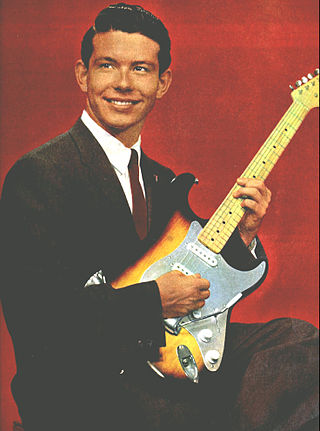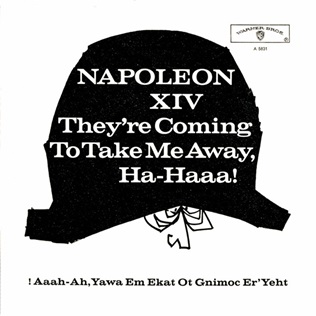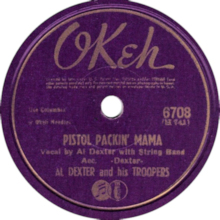
Decca Records is a British record label established in 1929 by Edward Lewis. Its US label was established in late 1934 by Lewis, Jack Kapp and Milton Rackmil, who later became American Decca's president too. In 1937, anticipating Nazi aggression leading to World War II, Lewis sold American Decca, and the link between the UK and US Decca label was broken for several decades. The British label was renowned for its development of recording methods, while the American company developed the concept of cast albums in the musical genre.

The Clovers are an American rhythm and blues/doo-wop vocal group who became one of the biggest selling acts of the 1950s. They had a top 30 US hit in 1959 with the Leiber and Stoller song "Love Potion No. 9".
"This Ole House" is an American popular song written by Stuart Hamblen, and published in 1954. Rosemary Clooney's version reached the top of the popular music charts in both the US and the UK in 1954. The song again topped the UK chart in 1981 in a recording by Shakin' Stevens.

"Mr. Sandman" is a popular song written by Pat Ballard and published in 1954. It was first recorded in May of that year by Vaughn Monroe & his orchestra and later that year by The Chordettes and the Four Aces. The song's lyrics convey a request to "Mr. Sandman" to "bring me a dream" – the traditional association of the folkloric figure. The pronoun used to refer to the desired dream is often changed depending on the sex of the singer or group performing the song, as the original sheet music publication, which includes male and female versions of the lyrics, intended.

Leslie Merrill Behunin, Jr., known professionally as Buddy Merrill, was an American guitar player and steel guitar player, best known as a regular on The Lawrence Welk Show.
"I'm Gonna Sit Right Down and Write Myself a Letter" is a 1935 popular song with music by Fred E. Ahlert and lyrics by Joe Young. It has been recorded many times, and has become a standard of the Great American Songbook. It was popularized by Fats Waller, who recorded it in 1935 at the height of his fame.
"Shrimp Boats" was a popular song in the 1950s.
Colpix Records was the first recording company for Columbia Pictures–Screen Gems. Colpix got its name from combining Columbia (Col) and Pictures (Pix). CBS, which owned Columbia Records, then sued Columbia Pictures for trademark infringement over the Colpix name.

"They're Coming to Take Me Away, Ha-Haaa!" is a 1966 novelty record written and performed by Jerry Samuels, and released on Warner Bros. Records. The song became an instant success in the United States, peaking at No. 3 on the Billboard Hot 100 popular music singles chart on August 13, No. 1 on the Cash Box Top 100 Pop Singles charts, No. 2 in Canada, and No. 4 on the UK Singles Chart.

"I'll Get By (As Long as I Have You)" is a popular song with music by Fred E. Ahlert and lyrics by Roy Turk that was published in 1928. Versions by Nick Lucas, Aileen Stanley and, most successfully, Ruth Etting, all charted in America in 1929.
"The Things We Did Last Summer" is a popular song about nostalgia from 1946. The words were written by Sammy Cahn, with the composition by Jule Styne. The most well known version is the 1946 Top ten hit by Jo Stafford. Versions by Frank Sinatra and by Vaughn Monroe also charted that year. Shelley Fabares had a hit cover in 1962 on the pop chart. Several recordings have been made, including versions by Frank Sinatra, Vaughn Monroe, and Dean Martin who recorded different versions for his 1959 and 1966 Christmas LPs.
"Takes Two to Tango" is a popular song, written by Al Hoffman and Dick Manning and published in 1952. Two versions of the song, by Pearl Bailey and by Louis Armstrong, charted in that year.
"One Monkey Don't Stop No Show" is the title of several different songs, mostly in the R&B genre, deriving from a common African-American phrase with the general meaning of "one setback should not impede progress". The first known recording with this title was by Stick McGhee and His Buddies in 1950. Commercially successful songs with this title were recorded by Joe Tex (1965), Honey Cone (1971) and Little David Wilkins (1975).

"Pistol Packin' Mama" was a "Hillbilly"-Honky Tonk record released at the height of World War II that became a nationwide sensation, and the first "Country" song to top the Billboard popular music chart. It was written by Al Dexter of Troup, Texas, who recorded it in Los Angeles, California on March 20, 1942, with top session musicians Dick Roberts, Johnny Bond and Dick Reinhart, who all normally worked for Gene Autry. It was used in the 1943 film Pistol Packin' Mama, starring Ruth Terry and Robert Livingston.

Richard Vernon Anthony Anthony was an American musician who composed, conducted, produced, sang and performed sacred music.

"Touch Me" is a song written and recorded by American country music singer Willie Nelson. Leveraged by the success of his songs, Nelson moved to Nashville in 1960. Through songwriter Harlan Howard, Nelson was signed to write for Pamper Music, and to a recording contract with Liberty Records.

Red Headed Stranger is a song written by Edith Lindeman and Carl Stutz, published in 1953. Originally written for Perry Como, the song was not recorded by him due to publishing issues. In 1954, Arthur "Guitar Boogie" Smith released a version of the song on MGM Records that received good radio play.
"Deep Night" is a song and jazz standard with a melody composed in 1929 by Charles E. Henderson and lyrics written by Rudy Vallee. The tune is written in a minor key.

Hugh Masekela's Next Album is the fourth studio album by South African jazz trumpeter Hugh Masekela. It was recorded in New York City and released in December 1966 via MGM Records label. The album consists mainly of covers of pop songs.
Lu Ann Simms was an American singer. She released pop 45s on Columbia Records between 1952 and 1957, Jubilee Records between 1957 and 1960, Top Rank Records in 1960, Vee-Jay Records in 1963 and Wand Records in 1965. She also released a handful of children's records on Columbia Records between 1953 and 1955. Her recordings were licensed by such record labels as Philips Records and Coronet Records for release outside the United States.












